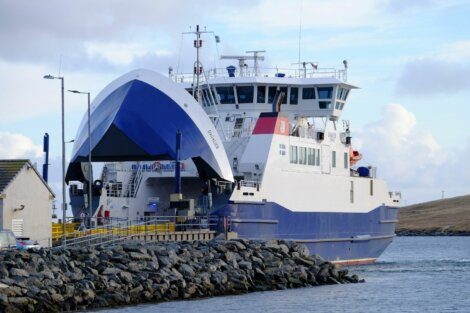Who stands for the Council? / Effort to bring down carbon emissions ‘needs energetic people to drive it forward’
Reducing fuel costs faced by islanders goes hand in glove with tackling poverty
The “Who stands for the council? It’s people like you” campaign aims to encourage more candidates to come forward for May’s elections to Shetland Islands Council. In the second of a series of features looking at some of the main issues the local authority is working on, through its corporate plan Our Ambition 2021-26, Environment and Transport Committee chair Ryan Thomson has been speaking about changes to the way people move around the islands and the importance of tackling fuel poverty in order to rein in carbon emissions.
THERE will be radical changes to how public services are delivered in Shetland over the coming decades as the community strives to play its part in turning the Scottish Government’s ambitious target of “net zero” carbon emissions by 2045 into a reality.
And while climate change legislation may not be written in the Town Hall, the next intake of councillors will have considerable input in shaping exactly how the community adapts.
A Scottish Parliament review into the role of councils in ensuring a “just transition” to net zero is ongoing, and Shetland Islands Council has already created a new climate strategy team that is working to ensure all departments are factoring the drive towards net zero into their policies and decisions.
Fundamental to that effort is devising a low-emission internal transport system that is likely to look quite different in a decade’s time – while reducing fuel poverty is a goal that goes hand in glove with reducing emissions through insulation and building more efficient new homes.
While hybrid cars and electric charging points are becoming a more familiar sight, virtually all forms of transport currently rely on hydrocarbons and transport accounts for over half the SIC’s carbon consumption.
Environment and Transport Committee chair Ryan Thomson has spent the past few years grappling with these issues. He says that, while climate change can be a “daunting subject for everybody”, getting involved at council level is a great way of playing a tangible part in what must ultimately be a global effort.
“Not only is it topical in the wake of COP26, but it is absolutely essential and arguably the number one priority for the council, to deliver on our climate change targets,” he said.
“We recognise that we’ve got to achieve ‘net zero’ by 2045, we recognise our ferry fleet is our biggest contributor of carbon emissions, and also recognise the number of jobs in oil and gas which, although reducing, remains a significant part of our economy.
“We have a lot of work to do as we phase out oil and gas, and phase in renewables. The foundations are there but it needs energetic people to drive it forward.”
While inter-island ferries are likely to remain part of the solution, when it comes to connecting residents in Unst, Yell, Whalsay, Bressay and other island communities with the Shetland mainland, successive councils have aspired to build fixed links.
The main roadblock is finance, and Thomson said lobbying the Scottish and UK governments to recognise the long term benefits of subsea tunnels – widely used in the Faroe Islands – would likely be an important part of councillors’ remit from 2022 onwards.
“If councillors determine that a tunnel is the best solution to replace a given ferry route, that is just the first part of the process,” Thomson said. “We then have to make the case to ministers to secure the sort of government funding necessary to make that a reality.
“These are massive decisions that could be massively beneficial to communities all over Shetland and it is vital that we get them right.”
Making the case to government for policies recognising the long-established fact that Shetland’s cost of living is much higher than elsewhere in the country will also remain key.
Thomson pointed out that around a fifth of the isles’ population spend over 20 per cent of their net income just to heat their homes. While unwelcome, that does mean the community stands to gain more from insulation schemes and more energy-efficient new homes to bring down residents’ heating costs.
“That goes to show how important public policy can be in tackling both climate change and the cost of living crisis,” Thomson said.
“I’ve always felt there’s more that unites us than separates us, and while people might disagree with individual policies, there are plenty of areas where – as a councillor – you’re arguing for things that are in everybody’s interest.”
The Covid-19 pandemic, meanwhile, has accelerated the shift towards more remote and home working.
This has its benefits for the wider workforce and the community as a whole, but Thomson pointed out another advantage – particularly for anyone living in the outer isles considering standing for council. They could save travel costs, time and fuel by taking part in meetings remotely when it suits, whilst helping to reduce the emissions associated with council activities.
While remote meetings have limitations “depending on each individual’s connectivity” and it “certainly doesn’t replace face-to-face meetings and the ability to network with colleagues, it certainly will have its place in the future and I’m sure hybrid meetings are going to be here to stay”.
Interested in standing to be a councillor this May? Find out more via the elections section on the SIC’s website.
Become a member of Shetland News
Shetland News is asking its readers to consider paying for membership to get additional perks:
- Removal of third-party ads;
- Bookmark posts to read later;
- Exclusive curated weekly newsletter;
- Hide membership messages;
- Comments open for discussion.
If you appreciate what we do and feel strongly about impartial local journalism, then please become a member of Shetland News by either making a single payment, or setting up a monthly, quarterly or yearly subscription.




























